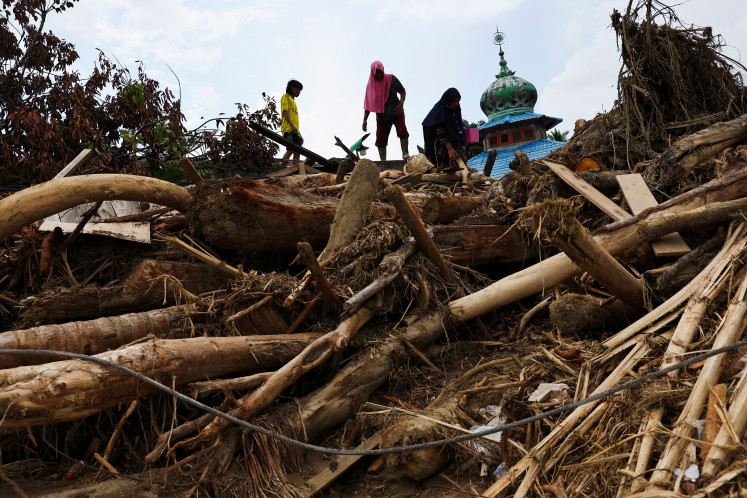Popular Reads
Top Results
Can't find what you're looking for?
View all search resultsPopular Reads
Top Results
Can't find what you're looking for?
View all search resultsEnergy crisis can still be avoided
Shining through: Oil processing activities at Poleng Process Platform prior to loading at Pertamina Abherka Floating Storage and Offloading, owned by PT Pertamina Hulu Energi West Madura Offshore in East Java
Change text size
Gift Premium Articles
to Anyone
S
span class="caption">Shining through: Oil processing activities at Poleng Process Platform prior to loading at Pertamina Abherka Floating Storage and Offloading, owned by PT Pertamina Hulu Energi West Madura Offshore in East Java. Antara/Wahyu Putro A
The government has shown goodwill to avert the predicted energy crisis by promising to create a better investment climate.
Indonesia is facing the potential of an energy crisis. Energy reserves and production have declined over the past few years, while energy consumption has steadily risen in line with economic growth. As a result, the gap between supply and demand is widening and putting mounting pressure on the economy.
Based on Energy and Mineral Resources Ministry data and current proven oil reserves of 3.4 billion barrels, Indonesia's reserve replacement ratio of oil presently stands at 47 percent, while gas stands at about 90 percent. But as a result of a lack of new discoveries, the ratio will rapidly decrease.
According to upstream authority SKKMigas data, currently, the production of oil and gas stands at 2.2 million barrels of oil equivalent per day (BOEPD). Oil lifting alone declined from 1.65 million barrels per day (BOPD) in 1977 to below 800,000 BOPD at present. During the first quarter of this year alone, oil lifting was recorded at only 762,000 (BOPD), which is lower than the state budget target of 825,000 BOPD.
From 2010 to 2025, Indonesia's energy demand is predicted to increase from 3.3 million BOEPD to 7.7 million BOEPD, mostly consisting of oil and gas. With the current rate of production, the energy demand will exceed supply by about 2.5 million BOEPD by 2025. Industrial players and analysts have warned the government over the last few years that maintaining the current situation would in all certainty lead to a serious energy crisis.
'Without a breakthrough to increase reserves and production, Indonesia will certainly face an energy crisis. Such a crisis will be felt from 2019, when Indonesia will become a net importer of oil and gas,' Lukman Mahfoedz, then president of the Indonesian Petroleum Association (IPA), warned last year.
He mentioned on several occasions that the Indonesian oil and gas industry faced many problems that had led to stagnated exploration activities.
Craig Stewart, who took over as IPA president in January this year, echoed the warning during a press conference on the IPA's 39th convention and exhibition from May 20 to 22. He said that all stakeholders should work together to find the right solutions to solve the current problems.
Stewart said an energy crisis had the potential to lead to an economic crisis. 'When that happens, then it will increase the subsidy, decrease state income and slow economic growth.'
According to him, the energy crisis can only be avoided by increasing exploration activities to find new reserves to meet the rising demand. That means the government needs to attract as much investment as possible in the energy sector. Investment is needed for exploration, production and for the development of infrastructure, especially infrastructure for gas as the government wants to push ahead with the conversion of oil fuel usage to gas, of which there is a much higher supply. During the last few years, investment in the oil and gas sector has declined, as evident in stagnant exploration activities that have resulted in no new reserves being discovered.
'To generate exploration and production, Indonesia will need a huge amount of investment for exploration and production. For that purpose, the government should simplify the regulations, streamline the bureaucratic procedures, provide incentives and business [opportunities] in Indonesia,' he said.
He said the absence of clearance, consistency and certainty of laws in Indonesia has dampened the interest of investors to conduct exploration activities, leaving the country with no discovery of new reserves. 'We used to only need two years to get licenses for oil and gas projects. Now we need up to 10 years, while the contract time frame is only set at 30 years,' he said.
Companies are required to obtain 341 licenses from 17 different government institutions before they can start an oil and gas project. The licenses are obtained from a number of ministries, including the Energy and Mineral Resources Ministry, the Environment and Forestry Ministry, the Finance Ministry, the Industry Ministry, SKK Migas and other institutions under the central government and local governments where the projects are located.
'We're particularly concerned with the land [acquisition] problems, which have stalled many projects, not only in the oil and gas industry but in other industries as well,' he said.
He pointed out that in addition to that, exploration was also hampered by legal inconsistencies, such as in the application of land and building taxes (PBB) and recently applications for letters of credit (L/Cs) and the obligation to use the rupiah in dealings.
'Those things are in the mind of investors once they want to invest. Investors don't mind about the law, but they need legal consistency and certainty in making their investment plans. If they see inconsistency might occur in the future, then they will be reluctant to invest,' he said.
He said that currently the condition had been worsened by the drop in oil prices on the global market. Oil prices have dropped from about US$100 per barrel early last year to about $60 per barrel currently. 'Globally, that's the real challenge for the oil and gas industry. It's happened so quick. It has further decreased the economics of projects in Indonesia,' he said.
Analysts say that the drop in international oil prices resulted from a combination of the reluctance of the Organization of Oil Exporting Countries (OPEC) to cut supply and the abundant production of US shale oil. As a result, many companies have been forced to introduce cost-cutting measures to survive.
Prompted by the gloomy global condition, upstream authority SKK Migas planning deputy Aussie Gautama said recently that production sharing contractors (PSC) would cut their work plans and budgets this year by at least 20 percent.
'Currently, we're working with the PSC contractors to revise their work plans and budgets this year. The revisions will affect our production this year and next year. A budget reduction of 20 percent will possibly cause a drop of production of about 5 percent,' he said.
According to him, several big companies, including PT Pertamina and Total E&P Indonesie, have stated that they will cut costs and reduce activities this year as a result of falling prices. Meanwhile, big-scale projects that require high technology and investment, such as the Indonesian Deepwater Development (IDD) by Chevron, Abadi in Masela Block by Inpex, Muara Bakau by Eni and Offshore North West Java by PT Pertamina Hulu Energy, are waiting for incentives and better deals with the government.
Analysts are divided on when oil prices will rebound, with some of them predicting that they will stabilize by the end of next year, while others say they will remain the same for several years, but once they rebound they will still be under $100 per barrel.
Some analysts and industrial players in Indonesia see the current condition as a chance to push up exploration activities, considering that oil and gas investment is long term in nature. 'If the government creates a conducive climate for investment and gives necessary incentives, especially for offshore projects, the government can still attract the necessary investment to the oil and gas sector,' said Stewart.
The government has promised to create a better investment climate by integrating all licensing under the Integrated One-stop Service at the Investment Coordinating Board (BKPM). The government is also seeking to revise the Oil and Gas Law with a view to strengthening its constitutional framework.
'We support the government in simplifying the regulations and in revising the law. But what we're proposing is that the revision should accommodate the solutions to the current problems. I think we all, as stakeholders, need to work together to find solutions to avoid the energy crisis,' Stewart said.










